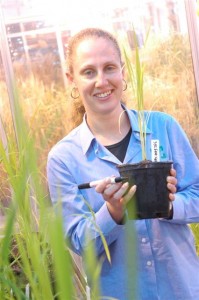Development of Research Potential
by the winner of the 2009 ASPS Teaching Award, Dr Amanda J. Able; School of Agriculture, Food and Wine, The University of Adelaide, Waite Campus, PMB 1, Glen Osmond SA 5064 Australia.
The principal means of learning for any individual is to perform a particular action and observe the outcome. Because moderation of the action changes the outcome, we learn the action that gives us the best outcome and change behaviour accordingly. This process is called action-based learning. As scientists we are innately curious. To be a scientist is to be curious and have a lifelong love of learning. This is what we want to impart to our students – we want them to learn how to be thinking about the why, how, when, what and where of life. Why? Because as Einstein once said,
“Imagination is more important than knowledge. Knowledge is limited, imagination encircles the world.”
Students can be provided with knowledge BUT to use that knowledge they need imagination. Traditional teaching does not provide that particular type of learning opportunity. Think lectures – think students asleep and unengaged. The traditional teaching approach is passive; students have to listen to learn and tend to absorb facts rather than concepts. This means they just learn for the exam (and not for life!).
As educators, we therefore need to adopt facilitation approaches. Rather than being a teacher, we should be facilitators of learning. Facilitation allows an environment for learning which is interactive, flexible, community-spirited and allows the learning of concepts. Problem-based learning is a facilitation technique that allows skill development because students face a ‘real-world’ problem. These problems are usually ill-structured (ie there is more than one solution) and minimal guidelines are provided. Action-based learning is a subset of problem-based learning but is more directive and generative so that the student can develop relationships between subsets of information and fully integrate them into their understanding. Using action-based learning therefore relies upon setting a ‘real-world’ task for students, providing demonstrations and analogies, and facilitating the problem-solving process. Action-based learning occurs because of the opportunity to build on other individual’s ideas through discussion, hear how others deal with a problem, make mistakes and correct them, and engage multiple learning paths. The use of action-based learning has proven successful for the development of research potential in undergraduate, postgraduate and vocational sector students in the field of molecular biology.
This presentation will provide an example of each of these and discuss the elements that allowed facilitation of student learning. A project for undergraduate plant molecular biology students that allows them to develop their own research proposal from a literature review will be showcased. Three years of data collection from participants in the project suggests that the ability to apply theory to practice is greater and enhances their desire to pursue an Honours degree. Patchwork assessment also helps them through the process. The role of learning facilitation and action in the success of professional development workshops for postgraduates and the DVD entitled ‘Introduction to Molecular Biology Techniques: Theory and Practice’ will also be discussed.
A little bit about the winner of the 2009 ASPS Teaching Award
Amanda was awarded the 2009 ASPS Teaching Award for the development of action-based and engaging approaches to stimulate independent and life-long learning of higher-order skills in plant science students. Amanda uses different problem-based and action-based learning techniques especially in more advanced courses such as Plant Molecular Biology where students already have some of the necessary skills. Through ‘real-world’ activities, students are enabled to engage in critical analysis and problem solving but are also inspired to life-long learning and improvement. Her student evaluation scores are consistently greater than 6.0 (out of a possible 7.0). This teaching award also recognises a number of other aspects of Amanda’s approach to teaching including:
- Using ‘action-based’ learning and patchwork and peer assessment to develop research potential in 3rd year plant molecular biology students. Over 75% of these students choose to do Honours.
- The use of one minute papers and ‘think, pair, share’ to facilitate learning.
- The delivery of professional development workshops to PhD and Hons students in the Molecular Plant Breeding CRC at ‘student retreats’. The three year review of the MPB CRC made special mention of the enhanced quality of training for the postgraduate students through this professional development.
- Leading a team which has developed a DVD and accompanying manual which introduces both the theory and practice of molecular techniques to tertiary-level students (see www.moleculartechniques.com.au).
| For more information: |
| Assoc. Prof. Amanda J. Able; Associate Dean (Undergraduate Experience); Faculty of Sciences; School of Agriculture, Food and Wine; The University of Adelaide; Waite Research Institute; PMB1 Glen Osmond SA 5064; AUSTRALIA |
| P: +61 8 8313 7245; M: +61 459 839 729; Email: amanda.able@adelaide.edu.au |
| Website: http://www.adelaide.edu.au/directory/amanda.able Lab group: http://www.agwine.adelaide.edu.au/plant_protection/ppp/ |

